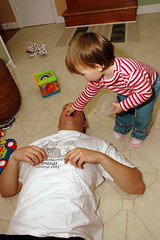 Image by kingary via Flickr
Image by kingary via Flickr
What's the explanation? Some evolved mechanism for automatically modelling eating actions, to ensure that those who depend on us are well fed? Something to do with mirror neurons? In acting out the eating, I am configuring my own facial muscles in the way I want the toddler to do. That means that, at some level, I must be mapping the features and actions of my own body on to his. Generally I think mirror neurons are a little overrated (I do not see, for example, how they can be anything more than a useful platform for social cognition and theory of mind) but here's something they could be helping out with.
I've noticed that the reflective feeding effect generalises, too. When you are helping a toddler to brush her teeth, you will probably find that you are sometimes contorting your lips in the way you want the child to do. The problem with the 'modelling' theory is that it suggests that this behaviour is intentional; that we parents are doing this for a purpose, to show the child how the thing should be done. It could be something much more reflexive, unconscious and automatic: a by-product of evolution, psychological development, or both.
Then, the other day, I noticed Isaac doing the same thing. He was feeding me a bit of ice lolly and mouthing the grateful acceptance he wanted my mouth to show. He's five, but he too was unable to suppress this instinct to model the feeding process. It's not only parents who can't keep their own selves still. My hunch is that the effect is specific to actions that involve the face and mouth, but I could well be wrong about that. What do readers think?
![Reblog this post [with Zemanta]](http://img.zemanta.com/reblog_e.png?x-id=feb2ffa5-3219-47f9-9c02-340184447945)





I think your hunch might be right - there is probably something special about face and mouth imitation. Certainly when dealing with actions that involve goals (rather than simple dyadic imitation per se) then infants seem to detect irregularities for actions involving hand-eye-mouth configurations, probably due to the primacy of oral exploration prior to 5 months of age. It does beg the question why these specific elements of imitation are given special status? Counter to this Meltzoff, suggests that not only facial imitation occurs from birth, but imitation of finger movements also occurs. It is possible that our adult configurations when attempting to elicit specific prosocial behaviour from our children are overlearned responses to the desire to have specific actions produced(?)
ReplyDeleteThis raises an interesting question that nobody has looked at (to my knowledge) - do infants at risk of autism fail to produce typical oral exploration in early development?
Thanks, Vincent. Yes, I remember that aspect of your work on this. I didn't know that Meltzoff had suggested imitation of finger movements - will look into that. Interesting idea re looking at infants at risk of autism.
ReplyDeleteAnother thought on this: do we just have difficulty inhibiting movements of face and mouth? Would still leave open the question of why we are making those movements in those contexts.
ReplyDelete